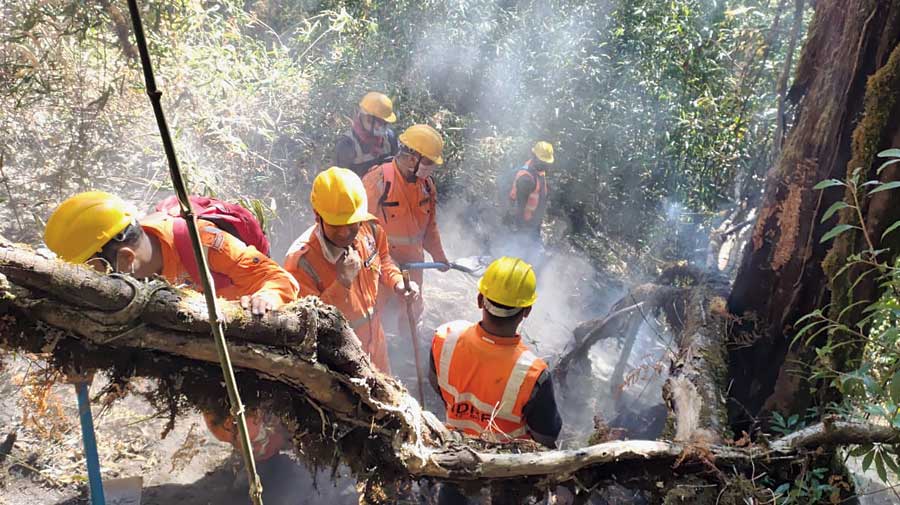Over 200 acres of forestland on Mount Iso in Manipur have been reduced to ashes in the wildfire raging in the Dzukou Valley along the Manipur-Nagaland border since December 29, while joint operations by the Centre, state agencies and local volunteers to contain the blaze was scaled up manifold on Saturday.
Dzukou Valley covers Senapati (Manipur) and Kohima (Nagaland) districts. It is called Dzuko Valley in Manipur and is a popular tourist and trekking destination known for its beautiful flowers and crystal-clear streams.
The Manipur chief minister’s office on Saturday said efforts to extinguish the wildfire in the hill ranges of Dzuko Valley in Senapati district continued for the fourth day.
After a thorough analysis of the landscape on Friday by a combined team of Senapati police, fire service and local volunteers, a stretch of 500 metres was cleared between the third and second mountain ranges of Mt Iso.
“The team successfully prevented spread of the fire towards the eastern side by using sand and fire extinguisher. However, the inferno still continued on the southern and western side and approximately more than 200 acres of Mount Iso range had already been reduced to cinders,” the statement said.
The fire on the Nagaland side was “under” control and it could be contained in another two days as operations to check the spread has been scaled up manifold in both states.
Johnny Ruangmei, officer on special duty, Nagaland State Disaster Management Authority, told The Telegraph on Saturday that four IAF choppers sprayed eight tonnes of water on the affected spots. A senior NDRF official said as many as seven teams are engaged in the operations with government personnel and local volunteers, including making over 3km of firelines to check the spread of the blaze.

NDRF and Manipur fire department personnel involved in the operation to contain the fire on the Manipur side on Saturday. Picture released by Senapati DFO
Ruangmei said IAF choppers lifted the water from Dimapur for spraying in the valley and made six sorties during the day. IAF official Ratnakar Singh said the “Bambi bucket” or spraying water operation will continue on Sunday.
Three drones were also used on Saturday to ascertain the spread of the fire and the damage.
“We will be able to know the damage only after getting the pictures which could not be transferred today because there is no mobile network in the affected areas and satellite phone is also not working,” Ruangmei said.
An NDRF official said the fire reportedly started from the Nagaland side on December 29, around 1.5km from the Manipur border. The NDRF has deployed three teams in Nagaland and four in Manipur, totalling around 280 personnel.
Manipur public health engineering minister Losii Dikho, currently camping at Mao, around 14km from the valley, to supervise the operation, chaired another round of review meeting with the representatives of Senapati district administration, police, NDRF, SDRF and fire services officials and decided that a base camp would be set up at the eastern side of Mt Iso to conduct the operations. About 100 personnel from Nagaland are camping in the affected areas.
A Manipur forest department official said steep terrain has hampered the containment of the wildfire which has destroyed bamboo shrubs in the upper slopes and is gradually spreading to thick forests located on the lower slopes because of strong winds.











